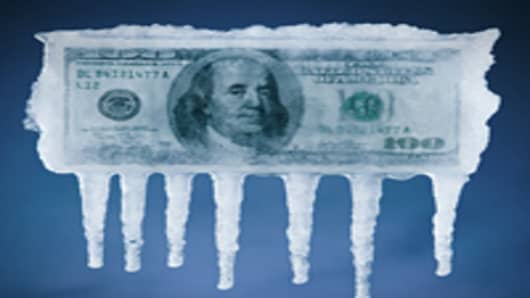Even good U.S. economic data can’t get the dollar going higher.
The dollar rose on a flutter of activity earlier Thursday, but after a few positive headlines out of Europe, it reversed course, tipping into negative territory, while the euro edged higher.
“This morning’s (gain) was about risk aversion, more problems in Europe and concern this was a problem for global growth,” said Robert Sinche, head of global foreign exchange strategy at RBS.
The euro had traded down to 1.2978 before rebounding above 1.30.
“We think three cents each side of 1.30” is the euro’s current range, he said. The dollar was also weaker against the Canadian and Australian dollars.
On a trade weighted basis, a weaker dollar benefits U.S. companies by cheapening exports, according to some experts, but the weakening dollar is also criticized for indirectly creating inflation.
The euro climbed back Thursday as concerns about Greece’s ability to reach a deal on a bailout plan faded. The currency got another leg up before midday, after German newspaper Die Welt said the European Central Bank will swap its Greek bonds for new ones.
The tight correlation between the euro and risk assets remains above 60 percent, but down from its high of about 80 percent, according to Marc Chandler of Brown Brothers Harriman. Stocks surgedalong with the euro in afternoon trading.
U.S. economic news was good for stocks even before the euro took off. But the gains in the single currency seemed to supercharge the move.
Weekly jobless claims fell 13,000 to a seasonally adjusted 348,000, the lowest since March 2008. Producer prices rose more than expected, by 0.4 percent, the largest gain since July, but the rising prices are not expected to ignite inflation.
“I think the lower levels of the dollar, in general, are very much reflecting the prospect of the Fed on hold for longer,” said Sinche.
“You could almost argue in terms of risk, it’s a benefit. In a sense, it’s the best of all worlds. You‘re getting better U.S. data, but you’re getting very little indication that the Fed will get in their way of that with tighter policy,” Sinche said.
The slightly hotter PPI data may have taken its toll on the 30-year TIPS auction Thursday. It yielded 0.77 percent but traders thought it would come in better priced with better demand.
Follow Patti Domm on Twitter: @pattidomm
Questions? Comments? Email us at marketinsider@cnbc.com




